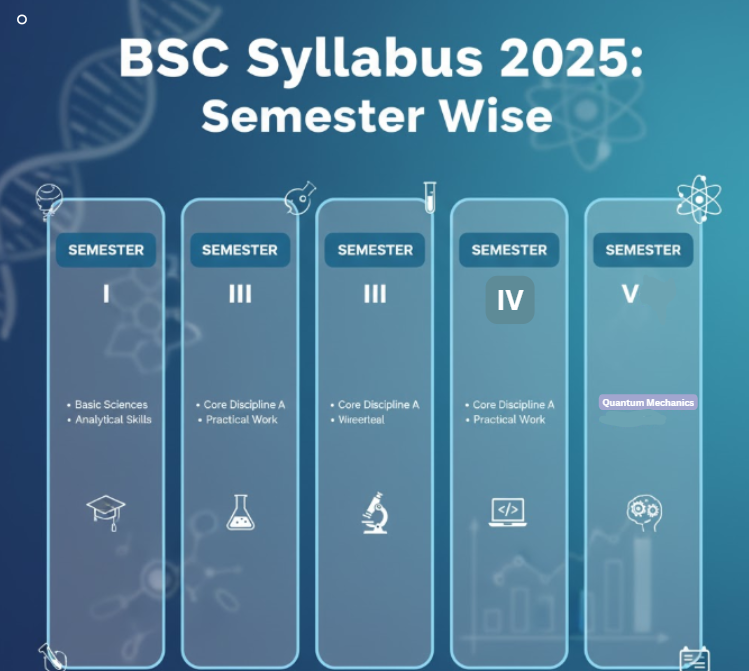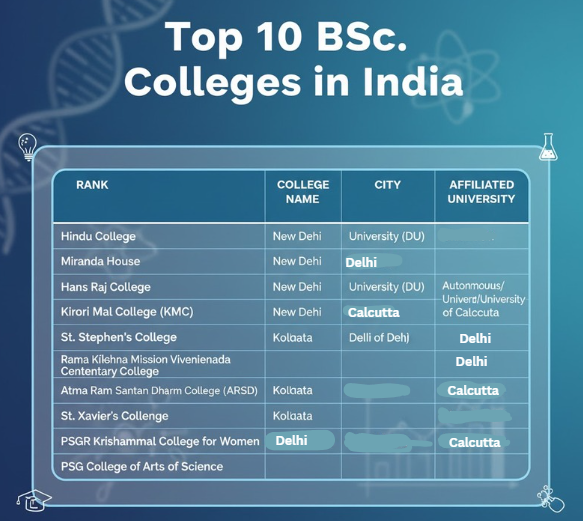BSc Syllabus 2025: The Bachelor of Science (BSc) is a fundamental undergraduate degree program intended to expand students' horizons intellectually and strengthen their grasp of numerous scientific fields. In addition to applied subjects like computer science, statistics, microbiology, genetics, agriculture, and nutrition, the extensive BSc curriculum covers a variety of fundamental disciplines, such as mathematics, physics, chemistry, zoology, and botany. Through this varied curriculum, students can build a solid scientific foundation and refine their abilities for real-world application.
The length of a standard BSc program is six to eight semesters, depending on the specialization chosen. Students must pass both theoretical and practical tests each semester in order to graduate. Many prestigious BSc institutions, such as Jawaharlal Nehru University, Delhi University, Banaras Hindu University, Jamia Millia Islamia, and VIT Vellore, are located in India. The cost of earning a bachelor's degree can vary significantly, with average course fees ranging from roughly INR 200 to INR 6 Lakh across different universities. This degree is necessary for those who wish to work in technology and research.
BSc Syllabus 2025: Semester Wise

The college and the chosen specialization (such as physics, computer science, or botany) have a substantial impact on the specific BSc subjects. While the whole semester-by-semester syllabus is detailed in the table supplied for reference, the curriculum is generally designed to provide a solid scientific basis over the duration of the degree through a combination of core, optional, and practical papers.
| BSc Courses- Semester I | |
| Basic Chemistry | Applied Physiology |
| Real Analysis I | Introduction to Organic Chemistry |
| BSc Courses- Semester II | |
| Chemistry Bonding | Research Methodology |
| Applied Biochemistry | Real Analysis II |
| BSc Courses- Semester III | |
| Cell Biology | Specialisation Elective I |
| Research Methodology II | Thermodynamics and Solutions |
| BSc Courses- Semester IV | |
| Applied Sciences | Specialisation Elective II |
| Professional Ethics | Dynamics |
| BSc Courses- Semester V | |
| Advanced Analysis | Quantum Mechanics |
| Design Experiment | Communication and Networking |
| BSc Courses- Semester VI | |
| Viva Voce | Professional Ethics II |
| Dissertation | Project |
List Of Top 10 B.Sc. Colleges in India

Some of the best B.Sc. colleges in India are listed below, mostly based on current national rankings such as the NIRF (National Institutional Ranking Framework), which is a reliable ranking for Indian educational establishments.
| Rank | College Name | City | Affiliated University (or Institution Type) |
| 1 | Hindu College | New Delhi | University of Delhi (DU) |
| 2 | Miranda House | New Delhi | University of Delhi (DU) |
| 3 | Hans Raj College | New Delhi | University of Delhi (DU) |
| 4 | Kirori Mal College (KMC) | New Delhi | University of Delhi (DU) |
| 5 | St. Stephen's College | New Delhi | University of Delhi (DU) |
| 6 | Rama Krishna Mission Vivekananda Centenary College | Kolkata | University of Calcutta |
| 7 | Atma Ram Sanatan Dharm College (ARSD) | New Delhi | University of Delhi (DU) |
| 8 | St. Xavier's College | Kolkata | Autonomous/University of Calcutta |
| 9 | PSGR Krishnammal College for Women | Coimbatore | Bharathiar University |
| 10 | PSG College of Arts and Science | Coimbatore | Bharathiar University |
Also Check:
-
MBA Syllabus 2025: Semester-Wise Subjects, Specializations, and Course Structure
-
Scored 450 marks in NEET 2025? Top Colleges in India for MBBS
-
BBA 1st Year Subjects 2025: Semester-Wise Subjects List & Syllabus
-
DAAD Scholarship 2025: Eligibility, Application and Registration Details Here
-
Top 10 Largest Colleges in Ahmedabad 2025: Courses, Eligibility & Admissions
-
Top Affordable MBA Colleges in India 2025: Fees, Ranking and Placements
-
Chevening Scholarship 2026: Eligibility, Benefits, Application Process & Important Details
BSc Core Subjects
Depending on the chosen specialization, the BSc core subjects—which usually include mathematics, physics, chemistry, and several life sciences like zoology and botany—are intended to provide a solid scientific basis.
- Mathematics: The majority of scientific fields are built on mathematics, which includes subjects like calculus, algebra, and differential equations. This fosters the critical thinking and problem-solving abilities needed for scientific applications.
- Physics: From classical mechanics to quantum theory, this discipline examines the underlying laws guiding the cosmos. It places a strong emphasis on laboratory work to comprehend force, energy, and matter qualities.
- Chemistry: The fundamental science of chemistry examines the make-up, structure, characteristics, and interactions of matter. Organic, inorganic, and physical chemistry are among the specialties that make up the foundation of the material and biological sciences.
- Botany: The study of plants, including their growth, structure, reproduction, and biological classification, is the main focus of botany. Research in agriculture, ecology, and the creation of novel medications all depend on it.
- Zoology: The study of animals and animal life, including their anatomy, physiology, and genetic makeup, is known as zoology. It offers a thorough comprehension of evolution, conservation biology, and biological diversity.
Also Read:
Top IIT Colleges That Offer Data Science Courses to Learn Online in 2025
Best Free AI Courses for Beginners in 2025
Best Pharmacy Colleges in India 2025 After 12th Offering High Job Placement
To stay updated on current trends, join the Jagran Josh Telegram Community!
